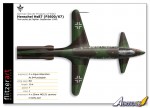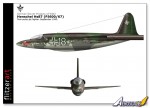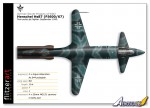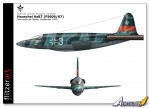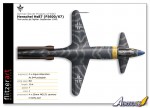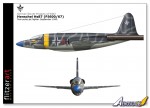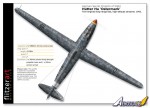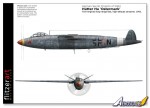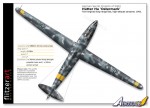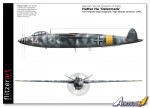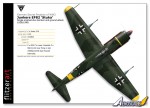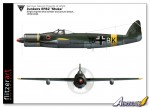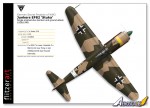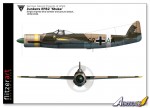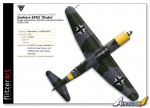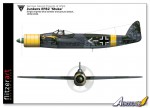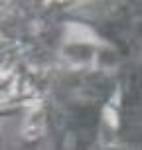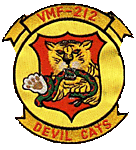1⁄1Luftwaffe Projects - Volume 9
10
Comments
Henschel P600/67J Twin Pulse Jet Low level and Ground Attack Fighter
Based on the basics learned from the larger Henschel Hs P87 design, Henschel Chief Designer Dipl-Ing Friedrich Nicolaus and his design team embarked on the PJ600/67 low-level and ground attack project. It was to be a canard layout with power provided by two Argus-Staurohre As.044 pulsejets mounted aft with one each side of the tail.The pilot was placed in the nose. The aim was to provide a capability to carry a 2,000 kg bomb load and to help keep overall weight down, no undercarriage was to be included. Take off would have been with the aid of a land or ship based catapult, plus in addition there were plans to use a ‘Mistelschlepp’ towed take-off as an alternative. Landing would have been by belly skids. Armament included 2 or 4 x MG.151/20 guns housed in a special "Waffen-wanne" belly pod similar to those used on the Ju-88G and the He-219.
The PJ600/67 project underwent wind tunnel testing but despite good results the RLM ordered all further work on it to be stopped. Little else is known, but it is believed that the project was seized by Russian forces in 1945.
Hutter Hu ‘Ostermark’ High Altitude Zerstorer
On 9th December 1942 Wolfgang Hutter presented a concept for a two/three-seat twin-engined long-range Zerstorer designated ‘Ostermark’. Construction was to be all-metal and the proposed powerplants were for DB 601A-1s installed side-by-side mid fuselage, each engine driving a set of contra-rotating four-blade propellers via extension shafts. This enabled one engine to continue operating while the other was shut down. Six fuel tanks housed in the fuselage provided a range of 3,000 km. Armaments included a Bordkanone firing through the propeller boss and a rear firing remote controlled cannon in the tail. The bomb load carried internally was 1,000 kg or alternatively a BT1000 Bomb-torpedo.Drawings exist of the side view cutaway and one of the fuselage plan view but no drawings are available showing the wings. For the profile the wings are shown as what was typical of Hutter designs. Also no reliable details for dimensions and other data remain. proportions are based on the known dimensions of the DB 601A engines.
Junkers EF82 ‘Stuka’
After the Spanish Civil War and as soon as WWII began, it became obvious, that the use of ground attack/dive bomber aircraft for the support of ground units was essential. It was also obvious, that the Ju87 had several inadequacies, which needed to be solved as a matter of priority. One approach was the Ju187, which was still based on the Ju87 and which mostly addressed the aerodynamic problems. The approach as depicted here was a completely new ‘Stuka’ aircraft design, which continued were the earlier EF 65 concept left off.In 1939 the EF82 was a further development step and was equipped with a Junkers Jumo 214 engine, which was a secret Junkers development carried out without the backing of the RLM. The design also showed a lot of design improvements including a retractable undercarriage and an internal bomb compartment for 1000kg bomb load. The EF82 was also designed for an aircraft carrier role, i.e. for the "Graf Zeppelin".
Except the engine design, no further data for the EF82 or EF65 are available. It is not known, if the design was presented to the RLM.
Comments
Cheers Peter
My pleasure. It's really impressive to see how your artwork increases steadily in sophistication with each new volume.
I'm intrigued by the mysterious Wn 19 - it does just look like someone's simplistic sketch of a '109, so it'll be really interesting to see if any firm information ever surfaces...
All the best
Rowan
OCT 09, 2012 - 08:08 AM
Many thanks JPTRR, nice to see you are still around site.
Rowan, should I learn of anything more on the Wn 19, I'll definitely share any findings. I'm sure there's a lot more to be discovered.
P
OCT 11, 2012 - 06:55 AM
Great work as always Peter, It's always nice to see a different take on the colour schemes and / or just to see these projects in colour. I do like the little Skoda 257 and the Fw-222.004, and then you tease with the last line 'Italian' for Vol.10, I can't wait, Re.2007 perhaps
OCT 11, 2012 - 07:45 AM
Wonderful stuff, as usual, Pater
Do you have any profiles of aircraft that saw combat during WWII (Spit, 109 etc)?
OCT 11, 2012 - 04:17 PM
Very interesting stuff, I hope to see more in the future.
Thanks for all the effort you put into this.
OCT 15, 2012 - 07:14 AM
Many thanks, I'm just enjoying myself really.
Luciano, Re2007....we'll see .
Mal.
I did do some profiles of some British aircraft that saw actual combat. It was years ago now but they were published on site.
I've not done any more since, apart from some early jets, as there are so many accomplished artists out there that cover these already, I've tended to seek areas that are less well populated if you see what I mean.
Tah muchly
Peter
OCT 19, 2012 - 03:33 AM
"....it was the first jet combat aircraft, the first twin-jet aircraft and the first jet aircraft to go beyond mock-up stage." not so "first" considering and other constructors of jet airplanes before 1941
DEC 26, 2018 - 05:17 AM
Copyright ©2021 by Peter Allen. Images also by copyright holder unless otherwise noted. The views and opinions expressed herein are solely the views and opinions of the authors and/or contributors to this Web site and do not necessarily represent the views and/or opinions of AeroScale, KitMaker Network, or Silver Star Enterrpises. Images also by copyright holder unless otherwise noted. Opinions expressed are those of the author(s) and not necessarily those of AeroScale. All rights reserved. Originally published on: 2012-10-06 00:00:00. Unique Reads: 15547




